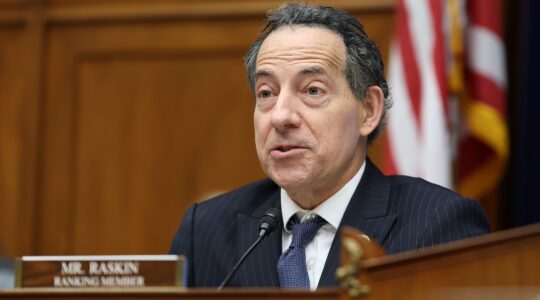WASHINGTON (JTA) — There were three winners in the Iowa Republican caucuses: Mitt Romney, Rick Santorum and, not far behind them, Ron Paul.
There were also (at least) three takeaways for Jewish observers: foreign policy matters, evangelicals matter — and Ron Paul matters.
The importance of foreign policy in the 2012 presidential race, even in a farm state once known better for the pledges for ethanol subsidies it extracts from candidates, was evident in the speeches following the voting.
Romney, the former Massachusetts governor and nominative winner — he bested Santorum, the former U.S. senator from Pennsylvania, by a mere eight votes — launched his speech with a broadside against President Obama’s Iran policy.
“Iran is about to have nuclear weaponry just down the road,” Romney told his followers. “He said he’d have a policy of engagement. How’s that worked out?”
Santorum’s strong showing — he and Romney split 50 percent of the vote evenly — was credited mostly to his months-long dedication to the state, working every county and making more than 300 appearances.
But Santorum’s strong foreign policy performance in the debates, in which he showed a command of detail stemming from his 12 years in the Senate, also was likely a factor.
In a New York Times profile published Wednesday, Santorum advisers said the candidate started to stress his own hard line on Iran after seeing how it elicited positive responses during his Iowa campaign.
Newt Gingrich, the former U.S. House of Representatives speaker who placed fourth with 13 percent, said in his speech that he would make his foreign policy differences with Paul, who finished third in Iowa with 21 percent of the vote, a campaign issue in New Hampshire, which has its vote on Jan. 10.
“I have no doubt about the survival of Israel as a moral cause which we have to recognize as central to our future,” Gingrich said in his speech, targeting Paul who has downplayed Iran’s potential nuclear threat and pledged to end aid to Israel if elected.
Aside from Gingrich, candidates faring less well in Iowa included Texas Gov. Rick Perry, who received 10 percent of the vote, and Rep. Michele Bachmann (R-Minn.), with 5 percent.
Perry, after initially saying he would “reassess” his campaign, announced he was staying in the race.
Bachmann, however, ended her drive for the nomination.
“I have decided to stand aside,” she said at a news conference Wednesday.
All three had at various times during 2011 experienced surges in the polls, a signal of the difficulties faced by Romney, who has struggled to break away from the pack and establish himself as the clear front-runner.
Romney’s albatross has been his reputation as a moderate in a party that has moved sharply to the right since the 2010 congressional elections, when the conservative Tea Party helped Republicans regain the House.
That was another factor explaining Santorum’s last-minute surge; he performed especially well in rural Iowa counties where evangelicals predominate. Santorum is a Roman Catholic, but his take-no-prisoners stance on abortion and gay marriage, and his defense of religious expression in the public square has appealed to the evangelical base.
“There is still an ‘anybody but Mitt’ camp, and it’s winnowed down by two today,” Fred Zeidman, a major fundraiser for Romney, said in an interview.
Santorum already was reaching out to pro-Israel fundraisers in the wake of his strong showing, insiders said. Those givers had mostly ignored him until now because of his back-of-the-pack showings in the polls until very recently.
Pro-Israel insiders said Santorum would likely get a more receptive hearing in the wake of Iowa, although whether it would be enough to assist him going into New Hampshire was another question. With voting in the first primary state just days away, Santorum has a minimal ground operation in the state.
As a senator, Santorum had a strongly pro-Israel record, but Zeidman said his social stances would ultimately alienate Jewish givers.
“They would be anathema to the community,” he said.
Paul’s showing kept him in the race. His 21 percent support — and his dominance among young and independent caucus-goers — have left him as a force to be reckoned with.
Jewish Republicans, however, have discounted his support as mostly coming from supporters who took advantage of Iowa’s relatively loose caucus rules; voters are allowed to register with the party up to the day of voting.
Jon Huntsman, the former Utah governor, did not compete in Iowa.

Help ensure Jewish news remains accessible to all. Your donation to the Jewish Telegraphic Agency powers the trusted journalism that has connected Jewish communities worldwide for more than 100 years. With your help, JTA can continue to deliver vital news and insights. Donate today.





